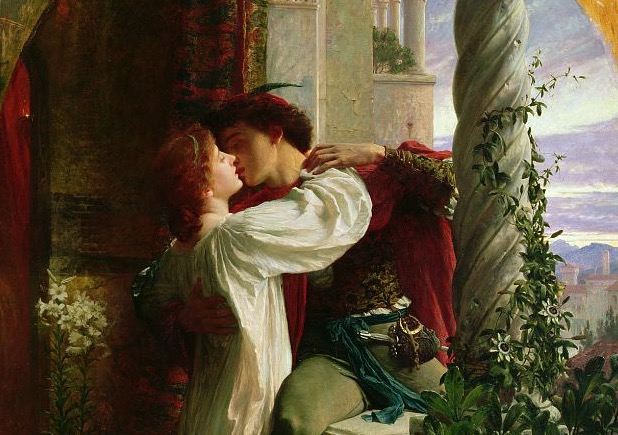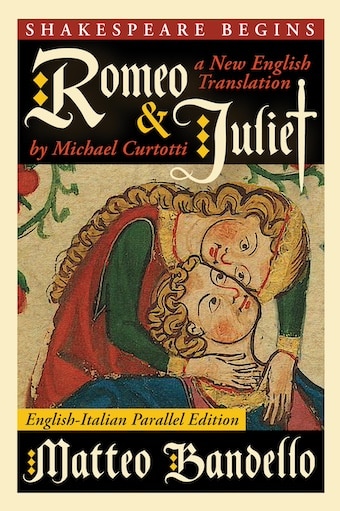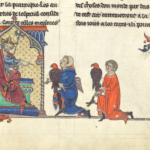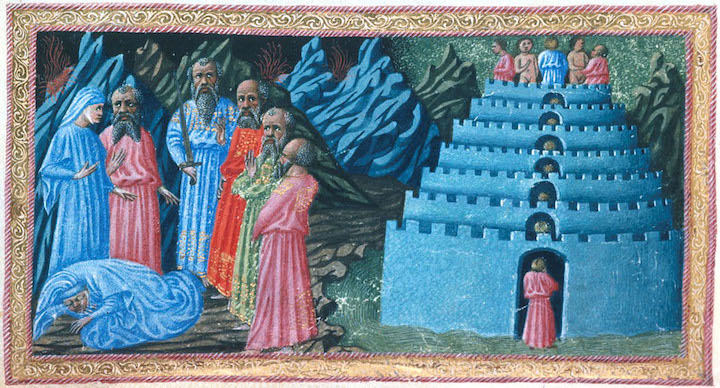
Matteo Bandello’s Forgotten Tale of the Tragic Lovers Romeo and Juliet
Sometimes, you just can’t believe what you turn up in history. If I told you a rather odd (and almost forgotten) bishop was the one who started the story of Romeo and Juliet ‘going global’, you would raise your eyebrows. But that’s what happened. His name was Matteo Bandello, and he wrote Romeo and Juliet before Shakespeare. In fact, he wrote hundreds of stories. And translated into French, English and Spanish, his stories made their way around Europe in his own lifetime. In England and Spain, his stories were adapted for the stage. Shakespeare loved Matteo Bandello’s stories so much, that he made four of them into plays. How did we forget such a character?
Believing that Shakespeare wrote Romeo and Juliet is like believing that Peter Jackson wrote the Lord of the Rings, and not even knowing Tolkien existed. Like others among Shakespeare’s plays, the story behind Romeo and Juliet originally came from Italy. It’s a Shakespearian tragedy that so few know that older versions exist or have ever read them.
Now it needs to be underlined, that the story we know, is Bandello’s story. Even though he too copied from earlier versions. Just about every plot element in Shakespeare’s Romeo and Juliet comes from Bandello, as explored in a previous article. Shakespeare adapted the story for the stage, used his own poetic language, and enhanced the story in other ways. Yet, we’ve also lost parts of the story.
Lost in translation (literally) was a beautiful and poignant monologue. When he is in Mantua, Romeo learns that Juliet has died (although she is in fact still alive at that point). Romeo blames himself, and the feelings he expresses are heartbreaking. In Bandello’s version, we also see the lovers briefly re-united before poison steals away Romeo’s life. We listen as they share their grief with each other. We see Juliet’s distress as Romeo dies in her arms. This just isn’t there in the Shakespeare version.
Matteo Bandello (1485-1561)
Below I have provided an English translation of Romeo’s monologue. It tries to capture the flavour of how Bandello tells the story and how he uses language. Surprisingly, the Italian he uses (which isn’t today’s Italian by any means) tracks very well into a kind of English. It is the kind of English we might expect in a tale from Bandello’s era. For those who love Tolkien (and you might have picked up already that I do), it’s a little like the language Tolkien uses in the Silmarillion and parts of Lord of the Rings. However, who was Matteo Bandello and why is he connected with the story of the star-crossed lovers?
So, if we are to believe Matteo Bandello, he tells stories, just for the sake entertainment. He even apologises for his Italian as he doesn’t come from Florence and can’t produce the same kind of Italian that someone like Boccaccio could (although Bandello loved to borrow from him).
Bandello was a priest (no doubt farmed out by the family to a role he wasn’t suited for) and he seems never to have been concerned with his ‘day job’. All he is known for is his writing. Still, it wasn’t always safe to be a writer in his time and place. And to keep the inquisitors at bay, he made sure he included generous tributes in his stories to well placed noble patrons (both male and female). In fact, he tells us he collected the stories while passing the time at their various residences.
If this was all you knew about him, you’d think he lived a rather dissolute and charmed life. As we come to know more about him another picture emerges. He seems to have been an obsessive writer and he knew tragedy. The world was in turmoil in his day. Italy was a colonial playground for Spain and France. The invading Spanish army sacked his own ancestral home. The looters took or destroyed many of his manuscripts (only some of which he was able later to recover). In fact, he recalls what happened to them in the introduction to one of his stories. Shakespeare later used that story as the basis of Twelfth Night.
We get more of a flavour of how he experienced the world, in that same introduction. In it, he describes the sacking of Rome in 1527 by an imperial army (under Charles V of Spain). Unpaid, the army mutinied and sacked the city for months. Their depredations devastated Rome’s population, which fell from 55,000 to 10,000. The sacking of Rome profoundly affected the course of history (although we barely remember it). It happened only ten years after Martin Luther’s proclamation. The majority of the soldiers of the army were Lutherans. The event contributed to permanent division of western Europe into separate religious camps as well as to decades of religious warfare.
Against this background, we can perhaps understand Bandello’s desire to escape his world and to seek solace and refuge in telling charming stories. He was never able to settle in Italy, for war was endemic and he eventually fled the peninsula, becoming a refugee in France. There, he enjoyed the patronage of the king of France, who appointed him as Bishop of Agen, a small city about midway between Bordeaux and Toulouse, in south-western France. He delegated all his official duties to his deputy and devoted himself to writing his stories, which even in his lifetime had appeared in translation. He was undoubtedly right in feeling that his writing was the most important thing he could be doing. Can we imagine a world in which stories like Romeo and Juliet, never became part of world culture?
So, let’s turn to some of Bandello’s words (in translation). Romeo is in Mantua. Balthasar (as Shakespeare calls him), Romeo’s servant, has just arrived. He has witnessed Juliet’s body borne in mourning into the tomb of her ancestors. Convinced she is dead (although she only sleeps), he must tell Romeo the news. We pick up the story at this point.
From Matteo Bandello’s Romeo and Juliet
“Balthasar entered Romeo’s house and found him still in bed. As soon as he saw Romeo before him, he was overwhelmed by countless tears and sighs and was unable to utter a single word. Romeo, was greatly surprised (and misfortunes other than those which had happened springing to his mind) Romeo said to him:
“Balthasar what ails you? What news do you bring from Verona? How is my father and the rest of ours? Speak, do not keep me in suspense! What could have caused you such distress? Come, deliver your news, whatever it be.”
Balthasar, at last overcoming his pain, his voice faint and his words halting, told him of Juliet’s death: that he had seen her carried to the tomb and that it was said that overpowering grief had killed her.
At such agonising and heartbreaking news Romeo was for a time outside his wits.
Then in a madness, Romeo leapt from his bed and said:
“Oh traitor Romeo, disloyal, perfidious and of all the ingrates the most thankless!”
“It was not grief that killed your love, for sadness does not kill.”
“No.”
“For you were the pitiless rogue; you the murderous fiend. You it was, that have compassed her death.”
“She wrote you that she would rather die than marry any other and begged you by any means to liberate her from her father’s house.”
“And you, blind, indolent, you lacklove, you miserable dog, you promised her you would go; that you would not fail and that she should be of good cheer.”
“Instead you indulged yourself from day to day, unable to steel yourself to do as she had begged.”
“You stood by, hands in pocket, and Juliet is dead.”
“Juliet is dead? And you yet live?”
“Oh traitor!”
“How many times have you written her and with your very lips affirmed that without her you cannot live?”
“And yet, still, here you are.”
“Where do you think she is?”
“She is there entombed within and wanders about waiting for you to follow her and she says to herself: ‘Ha, deceitful, false lover and faithless husband, who knowing of my death still bears to live.’ ”
“Forgive me, forgive me, my dearest wife! For I confess my grievous sin.”
“Forgive me that the pain beyond measure I feel is not enough to kill me.”
“I will myself perform that duty which pain and sorrow should have accomplished.”
“In spite of Death, who deigns not to take me, I will take death for myself.”
So saying, he seized the sword that lay by his bed and drawing it swiftly from its sheath, he turned the blade towards his chest and placed its point above his heart.
But that good servant Balthasar was quicker than he, so that Romeo was unable to harm himself. For in a moment, Balthasar had removed the weapon from his hand.”
[Translated by Michael Curtotti from Matteo Bandello Romeo and Juliet]
And so, we leave Romeo and the story that we know so well. Romeo will return to Verona, and there the lovers will meet their doom.
The above translation is part of a larger project to translate the whole of Bandello’s novella. I am hoping to publish the entire translation in the next few months (watch this space for news).
Update: Now available!
Image
Romeo and Juliet by Frank Bernard Dicksee, 1884.








